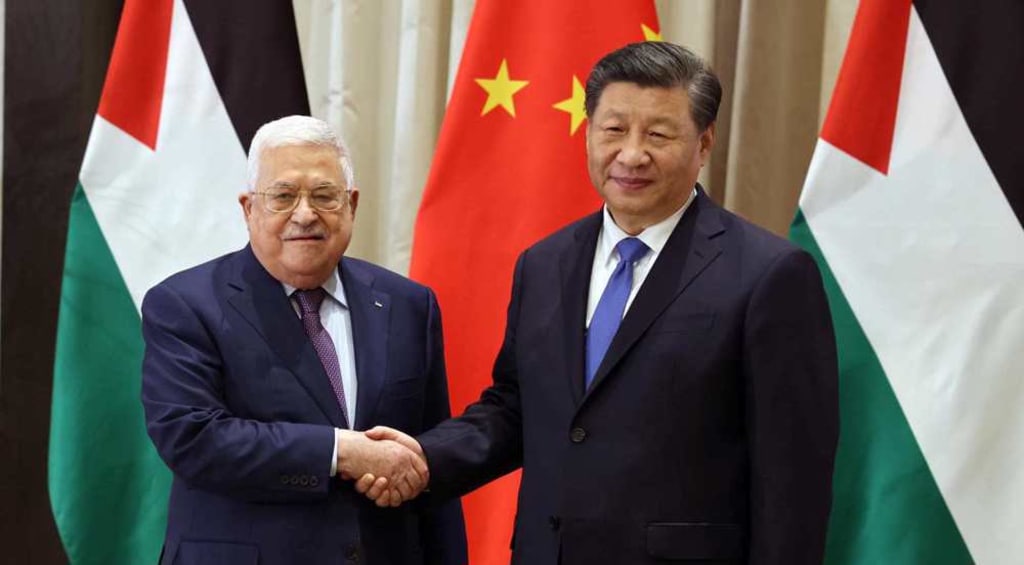Ending China trip, PA’s Abbas backs Beijing crackdown on Muslim minorities
In recent news, Palestinian Authority (PA) President Mahmoud Abbas has returned from his trip to China, where he expressed his support for Beijing's crackdown on Muslim minorities.

Ending China trip, PA’s Abbas backs Beijing crackdown on Muslim minorities
Outline:
Introduction
Background on the China trip
The stance of PA President Mahmoud Abbas
Justification for supporting Beijing's crackdown
Concerns and criticism
Human rights implications
International response
The impact on Palestinian relations with Muslim-majority countries
Conclusion
FAQs
Article:
Ending China trip, PA’s Abbas backs Beijing crackdown on Muslim minorities
In recent news, Palestinian Authority (PA) President Mahmoud Abbas has returned from his trip to China, where he expressed his support for Beijing's crackdown on Muslim minorities. This unexpected stance has sparked both praise and criticism from various quarters. In this article, we will delve into the details of Abbas' position, explore the justifications put forth, and analyze the potential implications of this decision.
1. Introduction
President Mahmoud Abbas' visit to China has attracted significant attention due to his endorsement of the Chinese government's approach to Muslim minorities. This departure from the traditionally vocal support for oppressed groups has surprised many and led to a heated debate about the underlying motives.
2. Background on the China trip
The purpose of Abbas' visit to China was to strengthen bilateral relations between Palestine and China. This diplomatic mission aimed to foster cooperation in various sectors, including trade, infrastructure development, and technology exchange. The trip was also an opportunity for President Abbas to seek support for the Palestinian cause on the international stage.
3. The stance of PA President Mahmoud Abbas
During his visit, President Abbas expressed his full support for China's policies regarding Muslim minorities, including the Uyghur population in Xinjiang. He praised the Chinese government's efforts to combat extremism and terrorism, emphasizing the importance of stability and security in the region.
4. Justification for supporting Beijing's crackdown
President Abbas justified his position by highlighting the similarities between the challenges faced by China and Palestine. He argued that both nations have been victims of terrorism and separatism and must take strong measures to protect their sovereignty and maintain stability. Abbas also commended China's economic progress and its potential to contribute to the development of Palestine.
5. Concerns and criticism
Abbas' support for China's crackdown on Muslim minorities has drawn significant criticism from human rights organizations, activists, and several countries around the world. Critics argue that the Chinese government's actions amount to human rights violations, with reports of mass detentions, forced labor, and cultural suppression. They highlight the importance of upholding universal values and protecting the rights of marginalized communities.
6. Human rights implications
The endorsement of Beijing's policies by the PA President raises concerns about the Palestinian Authority's commitment to human rights. It has sparked debates within Palestine and among international observers about the alignment of the Palestinian cause with the principles of justice, equality, and freedom.
7. International response
Abbas' stance has also created ripples in the international arena. Some countries, particularly those with close ties to China, have commended his position. However, several Western nations and Muslim-majority countries have expressed disappointment and urged President Abbas to reconsider his support for the Chinese government's actions.
8. The impact on Palestinian relations with Muslim-majority countries
The endorsement of China's crackdown on Muslim minorities may strain Palestine's relations with other Muslim-majority nations. Countries that have historically supported the Palestinian cause are now grappling with the contradiction of a Palestinian leader endorsing policies that target a Muslim community. The consequences of this development on diplomatic ties and regional alliances remain to be seen.
Conclusion
President Abbas' support for Beijing's crackdown on Muslim minorities during his China trip has triggered a wave of controversy and raised questions about the alignment of the Palestinian cause with human rights principles. While Abbas justifies his position by drawing parallels between the challenges faced by China and Palestine, critics argue that endorsing actions that infringe upon the rights of marginalized communities undermines the Palestinian Authority's credibility. The international response has been mixed, with both support and condemnation from various quarters.
FAQs
1. Has the Palestinian Authority always supported oppressed groups?
Historically, the Palestinian Authority has been vocal in supporting oppressed groups and advocating for human rights. However, President Abbas' recent endorsement of China's crackdown on Muslim minorities marks a departure from this stance and has generated significant debate.
2. What are the concerns raised against China's actions in Xinjiang?
Critics have raised concerns about human rights violations, including mass detentions, forced labor, and cultural suppression, against the Uyghur population in Xinjiang. These actions have been widely condemned by human rights organizations and several countries.
3. How has the international community responded to Abbas' position?
The international community has shown a mixed response to Abbas' support for China's crackdown. Some countries, particularly those with close ties to China, have commended his position. However, Western nations and Muslim-majority countries have expressed disappointment and urged him to reconsider his stance.
4. What impact could this have on Palestinian relations with other Muslim-majority countries?
The endorsement of China's crackdown on Muslim minorities may strain Palestine's relations with other Muslim-majority nations. Countries that have historically supported the Palestinian cause are now facing a contradiction with a Palestinian leader endorsing policies that target a Muslim community.
5. Will this decision affect the Palestinian Authority's credibility?
Abbas' support for Beijing's crackdown has raised questions about the alignment of the Palestinian cause with human rights principles. Critics argue that endorsing actions that infringe upon the rights of marginalized communities undermines the Palestinian Authority's credibility, while supporters highlight the importance of stability and security in the region.





Comments
There are no comments for this story
Be the first to respond and start the conversation.